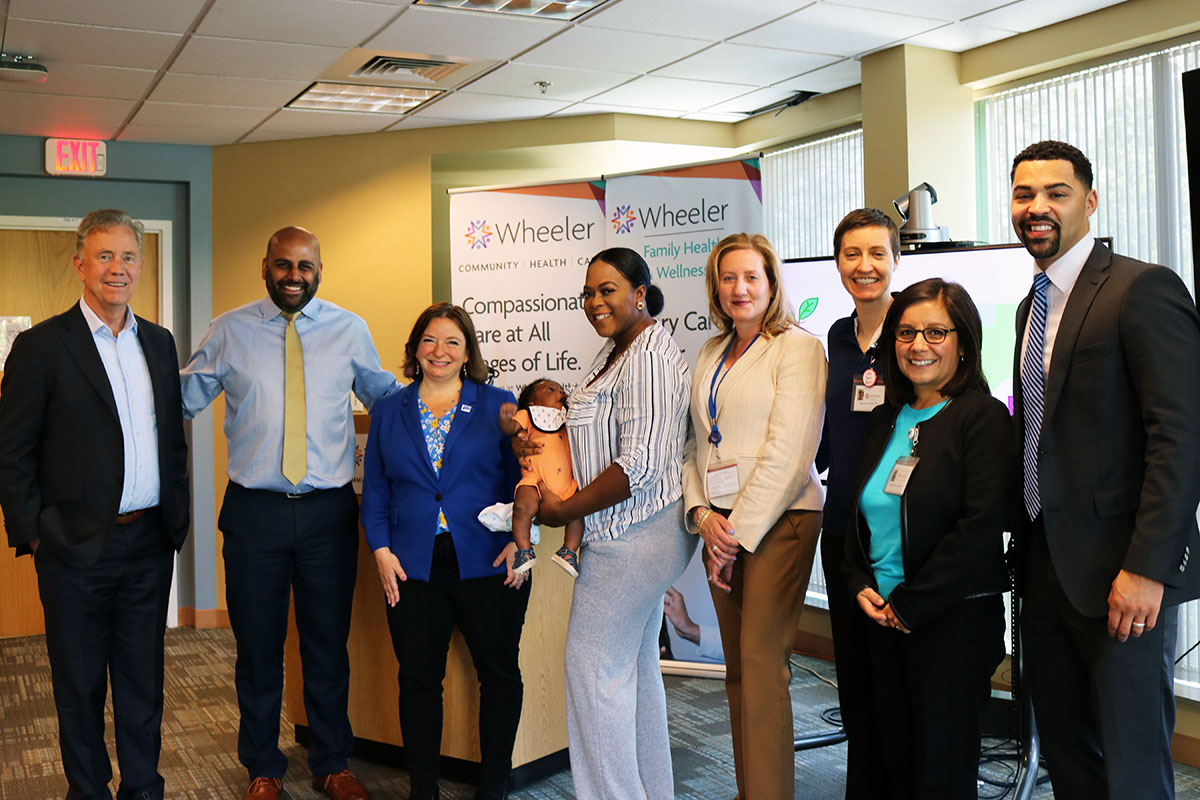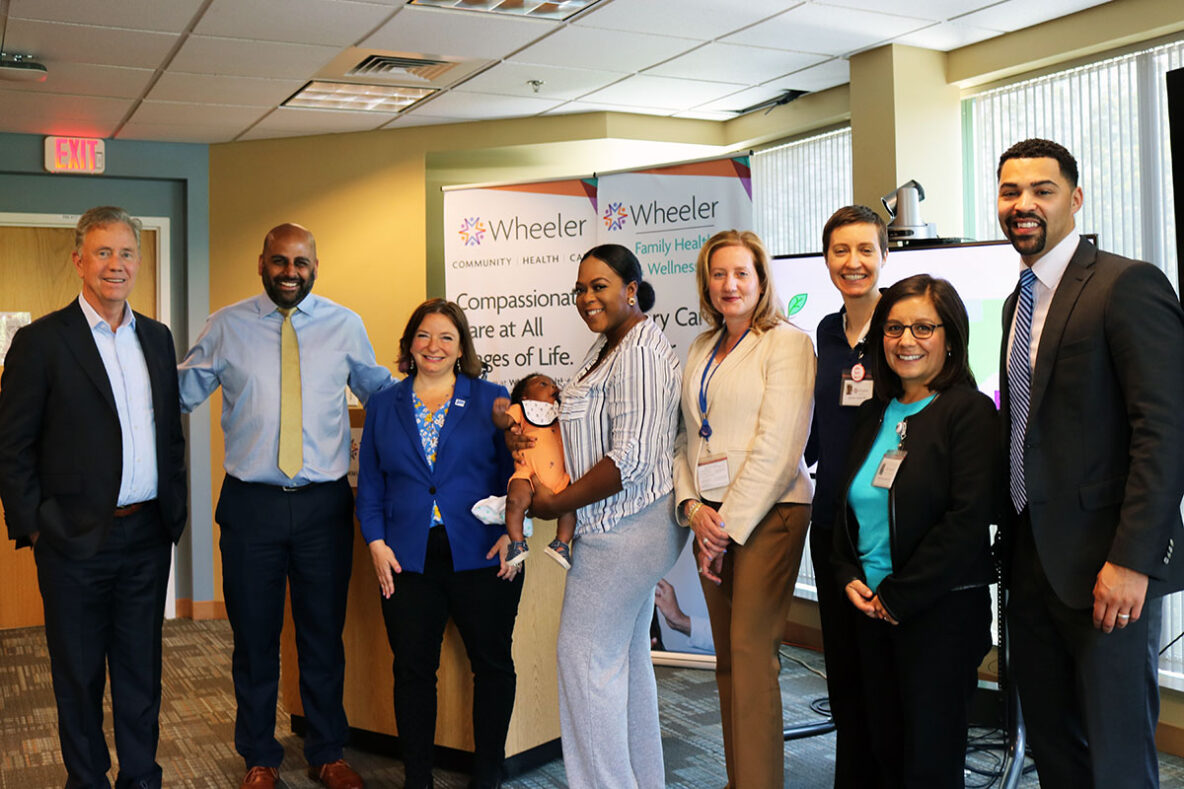Interview with Deb Polun, CHC/ACT Chief Strategy Officer | June 24, 2024

Baby Bonds are an increasingly popular bipartisan government policy in which every child born into poverty receives a publicly funded trust account at birth. This “start-up capital” allows young adults to access education, home ownership, and entrepreneurship, enabling them to build wealth and lead lives that are hopeful, fulfilling, productive, prosperous, and self-directed. Follow our Baby Blogs series to learn about the vision, politics, and people behind Baby Bonds and their transformative impact on the lives of young people, their families, communities, and our economy.
In this installment of Baby Blogs, we spoke with Deb Polun, Chief Strategy Officer at the Community Health Center Association of Connecticut (CHC/ACT), about Community Health Centers, how Baby Bonds will impact health center patients and their families, and the role of health centers in educating families about Baby Bonds as investments in their children.
Can you share a little about your journey and background?
DP: I’m the Chief Strategy Officer at the Community Health Center Association of Connecticut (CHC/ACT). I have been involved in the field of public policy impacting low income people for about 25 years. I started off as a policy analyst in the General Assembly working for the Senate Democrats Office.
I stayed there for nine years and moved over to the Connecticut Commission on Aging, then over to the Community Health Center Association of Connecticut for seven years. In 2019, I became the executive director of the Connecticut Association for Community Action (CAFCA), and I returned to CHC/ACT last summer.
I’m also a local elected official. My work has always been about trying to utilize public policy to improve people’s lives. That’s what I’m committed to.
When and how did you first hear about Baby Bonds?
DP: In addition to there being an income gap, there is also a wealth gap. The wealth gap is almost harder to overcome than an income gap. Those with wealth are able to pass down houses from parents to their children or grandchildren. They’re able to help pay for college or help with a down payment on a house, and this is the kind of thing that’s available to people who are in the middle class.
But for many, this feels completely unachievable if you don’t have that generational wealth that’s been passed down over time. So even if you’re making a decent income, if you don’t have a home equity line or some savings or stocks that you can dig into, you’re just not able to help your kids with that.
Baby Bonds is one solution to that problem. And I think it’s a great solution. The idea that we as a state are investing in the next generation of kids is something that speaks really strongly to me. We’re not just trying to help people right now—we’re showing them that we’re investing in them right from birth and believe that they’re going to be able to contribute to the community and society once they’re grown up. We’re giving them hope and setting their eyes to a bright future.
Is there anything about this policy that speaks to your own experience growing up, or from your wealth journey?
DP: Something happened to me in the last couple of years that came from a place of privilege. My son and his then-fiancée decided about two years ago that they wanted to buy a house. Now, my son graduated college a few years ago. He’s a software developer. He makes a good income, and they started house hunting. We were also planning a wedding at the time. We said, “We’re going to give you money towards a down payment.” And his fiancee’s parents said, “We’re also going to give you money towards a down payment.” So both sets of parents did that, and that is how they were able to buy a house. We were thrilled that we were able to do that for our kids.
It really struck me that, despite the fact that they had a good amount of money coming in regularly, it probably would have taken them another couple of years to pull together a down payment for a house. They were paying rent somewhere, right? So the idea of, “How are we going to come up with $20,000 or more?”—we felt really fortunate that we were able to help contribute to that for them, and I know that his in-laws feel the same way. It hits home that that’s not available to everybody.
Your work is with a group of community health centers around the State. Can you say a little bit more about why something like Baby Bonds is in the interest of community health centers in Connecticut?
DP: Our Community Health Centers provide medical, dental, behavioral health care, and other services to about 420,000 Connecticut residents of all ages every year. We are rooted in our communities—each health center has a board of directors, and 51 percent of the board members must be patients. Our goals are to improve the health of our patients, while also improving the overall health of our communities.
Community Health Centers serve all people, regardless of ability to pay, and the vast majority of our patients (about 60 percent) are on HUSKY/Medicaid. Another 16 percent are uninsured. About two-thirds are living below the poverty level.
Poverty impacts every aspect of our patients’ lives, including their health. So we know that too many of our patients simply do not have the opportunity to purchase homes or pay for higher education or job training—the types of investments in people that Baby Bonds will provide. Helping the next generation overcome the barrier of intergenerational poverty will be so impactful in their quality of life—and in our success as a state. That’s where Baby Bonds speak to the work of the Community Health Centers.
What advice would you give to Community Health Centers across the country in deciding whether or not to engage with Baby Bonds? How can they contribute to the momentum in getting Baby Bonds over the finish line?
DP: Other Community Health Centers should absolutely engage with Baby Bonds because it’s to the benefit of the people that they serve. Get in on the ground level and try to build coalitions for and with other partners. You have to build and strengthen those partnerships to get a groundswell of support for this program, because it is the kind of thing where we’re putting a lot of money and effort in, yet we’re not going to see the results for another 18 to 20 years.
And this isn’t the way that we normally make public policy. In public policy we normally want to see the effects of a proposed initiative within a year, or else we’re not going to support it. Baby Bonds are really more long-term thinking, which is needed because if we’re going to help lift up people out of poverty, then we need to plan for that for the future. And so, yes, Community Health Centers that have the opportunity to advocate for a policy like this absolutely should. Then, once it gets implemented, continue to be involved so that you’re helping your patients know that this financial support is waiting for them when the time comes. You are providing hope to your patients and their families. I think it’s critical for Community Health Centers to get involved right from the get go and then stay involved.
Would you be able to speak more to what family engagement with Baby Bonds will look like?
DP: We actually recently announced a partnership with Treasurer Russell where the health centers will be educating families about Baby Bonds. The most wonderful thing is that we already have thousands of patients born since last July, who have Baby Bonds in their names! We had one of these infants at the press conference, and honestly, it took my breath away—to see this little guy and his mom and to know what’s waiting for him 18 years down the pike, to know that the leadership of our state has invested in him.
Governor Lamont and Treasurer Russell and their teams are committed to working with Community Health Centers and other partners to help spread the word to Baby Bonds recipients that these funds exist, are waiting for them—and then how to access them down the line. Ideally, the State will set up a website where you can literally enter your kid’s birthday and get a pop up that says if your child qualifies, when your child will receive those funds, and how much those funds are. Our health centers see these kids on their annual check-ups, their dental cleanings, and more—so their staff can sit down with families regularly and say, “Hey, take a look at this. This is waiting for you!”
Do you see any vulnerabilities in Baby Bonds? What should we keep in mind?
DP: We want to make sure that people are hearing from trusted sources—like Community Health Centers—that Baby Bonds is a real program designed for families to help improve their life situations and into the future.We have to be aware that there might be some untrustworthy players out there, scam artists, who may try to contact people and promise them false funding.
We also want to make sure that the funding is sustained because we’ve made a promise to these kids. After we first passed the legislation and it was stopped, I felt badly that we had already made that promise, and we had expected that babies born two years ago would already have access to Baby Bonds. It felt uncomfortable that we as a state weren’t able to follow through with that promise.
Advocates need to be vigilant and make sure that this program continues and that we’re advocating on behalf of Baby Bonds. We have to keep an eye on these investments and that they continue to be made accessible for future children. This time we’re going to keep that promise. Community Health Centers have been around for 60 years and we’ll be here for another 18-20 when those first Baby Bond babies receive their promise from the state of Connecticut.
Deb Polun is the Chief Strategy Officer at the Community Health Center Association of Connecticut (CHC/ACT).
If you missed previous installments of our Baby Blogs series, read them here.
Learn more about Baby Bonds in Connecticut.
To share feedback on this blog, or for questions about Baby Bonds, email David Radcliffe at radclifd@newschool.edu.
To learn more, explore our Baby Bonds resources.

